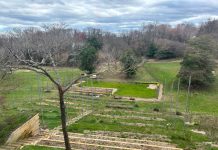By John Burton
While the presidential election is over, anxiety not only remains but has increased for some communities as they plan for their futures.
Specifically, the Hispanic and Islamic communities are contemplating what their next steps should be as they come to terms with the often incendiary rhetoric of the campaign that may in fact turn into public policy as Republican Donald J. Trump prepares to enter the Oval Office in less than two months.
Rita Dentino is director of Casa Freehold, an outreach organization for recently arrived immigrants. The organization’s clients she’s been speaking with had initially expressed some shock over the election outcome, which has since turned to fear for many.
And there is spillover that Dentino believes is a direct result from Trump’s posturing about Mexicans. “We’re already experiencing, sadly, some of our community being badly treated under Trump’s messaging,” she said, detailing the story of a Hispanic family walking through Freehold Raceway Mall following the Nov. 8 election. The family was confronted by a group that taunted them, telling them they won’t be here long and that Trump will send them “home.” “They didn’t know anything about their (the family’s) immigration status,” Dentino said. “Terrible.”
“Folks are absolutely terrified, as you can imagine,” noted Frank Argote-Freyre, director of the Latino Coalition of New Jersey, a policy and advocacy organization. Especially, Argote-Freyre added, since Trump said in his recent interview on the TV news magazine “60 Minutes” that his intention was to deport about 2 million undocumented aliens – largely those suspected of criminal activity – in pretty short order.
“I have a lot of families who feel scared,” said Isabel Lopez Kopilik, a self-described community advocate in the Red Bank area who volunteers for a number of organizations that assist the immigrant population. “A little more scared now.”
Kopilik said families she’s been working with fear that undocumented parents may be taken into custody, separating them from their American-born children. Some fathers said they would rather leave the country on their own accord, taking some personal effects and some money, as opposed to being placed in custody, Kopilik said, relating her conversations. “They’re afraid of being scooped up,” in some sort of federal dragnet, she said.
In other cases, teenagers who were born here, “are so extremely sad and disappointed to find out they’re not wanted,” given the tenor and tone of political rhetoric, she said.
For others, who saw President Barack Obama’s 2012 executive order establishing Deferred Action for Childhood Arrivals (DACA) as a lifeline for the so-called “Dreamers” – those who came to the U.S. as young children with their families – the fear is they willingly gave the federal government information about their lives and whereabouts, Argote-Freyre pointed out. “This would be a logical place to start if you were inclined to start mass deportations,” Argote-Freyre noted.
Some are considering relocating in hopes of making it more difficult to locate them, Argote-Freyre said.
There is fear that President-elect Trump will repeal many of Obama’s executive actions, including DACA. “So, if you haven’t been approved by January,” Argote-Freyre said, “all bets are off.”
In response to the incoming administration and its possible steps, groups like these have begun strategizing as to what steps need to be taken to ensure people’s rights and protection under the law. “The biggest thing we all have to do is unify,” Dentino explained.
“By unifying I mean everyone,” she added. “Immigrants, people with disabilities, even women, all religions that don’t fall in his (Trump’s) category of Christian.”
There is strength in numbers, she believed; and if you total up those groups, you’re talking about half of the nation’s population.
“These people need to become visible,” Dentino added. “Visible in a good way, in a peaceful way.”
Seham Abdala, director of the New Jersey Islamic Networks Group, an East Brunswick educational group, said she wasn’t pleased by the election results. But, she added, “Our religious affiliation and our Constitutional commitment lead us to respect the outcome of the democratic process.”
She, like Dentino, sees hope in having voices heard over the din of division. “It is about banding together,” she stressed. “We’re going to continue to stand up for our rights and the rights of others.”
We may be getting a little ahead of ourselves responding to political stump speeches, suspected John Leschak, a veteran immigration lawyer in Freehold.
Leschak is advising clients to continue to file for DACA, or Deferred Action for Parents of Americans (DAPA). The reason, he points out, is there are just 23 federal immigration courts with about 400 judges. As it currently stands “The backlog in immigration courts is unbelievable,” he maintained. Any attempt in ramping up action, and “the judiciary would just collapse,” he said.
One thing, though, that might actually come out of this debate, Leschak offered, is comprehensive practical immigration reform, as federal lawmakers find themselves having to face the issue. “I think that would be the most ironic development,” he said.














